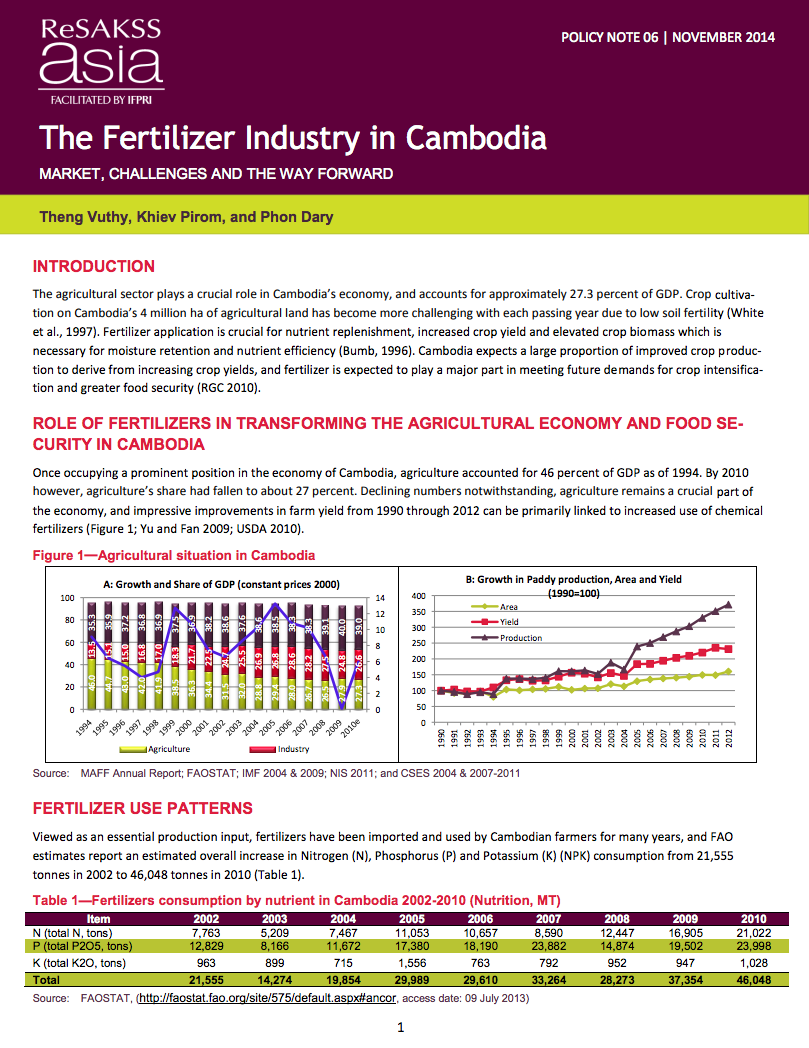Focal point
Location
About IFPRI
The International Food Policy Research Institute (IFPRI) provides research-based policy solutions to sustainably reduce poverty and end hunger and malnutrition in developing countries. Established in 1975, IFPRI currently has more than 500 employees working in over 50 countries. It is a research center of theCGIAR Consortium, a worldwide partnership engaged in agricultural research for development.
Vision and Mission
IFPRI’s vision is a world free of hunger and malnutrition. Its mission is to provide research-based policy solutions that sustainably reduce poverty and end hunger and malnutrition.
What We Do
Research at IFPRI focuses on six strategic areas:
- Ensuring Sustainable Food Production: IFPRI’s research analyzes options for policies, institutions, innovations, and technologies that can advance sustainable food production in a context of resource scarcity, threats to biodiversity, and climate change. READ MORE
- Promoting Healthy Food Systems: IFPRI examines how to improve diet quality and nutrition for the poor, focusing particularly on women and children, and works to create synergies among the three vital components of the food system: agriculture, health, and nutrition. READ MORE
- Improving Markets and Trade: IFPRI’s research focuses on strengthening markets and correcting market failures to enhance the benefits from market participation for small-scale farmers. READ MORE
- Transforming Agriculture: The aim of IFPRI’s research in this area is to improve development strategies to ensure broad-based rural growth and to accelerate the transformation from low-income, rural, agriculture-based economies to high-income, more urbanized, and industrial service-based ones. READ MORE
- Building Resilience: IFPRI’s research explores the causes and impacts of environmental, political, and economic shocks that can affect food security, nutrition, health, and well-being and evaluates interventions designed to enhance resilience at various levels. READ MORE
- Strengthening Institutions and Governance: IFPRI’s research on institutions centers on collective action in management of natural resources and farmer organizations. Its governance-focused research examines the political economy of agricultural policymaking, the degree of state capacity and political will required for achieving economic transformation, and the impacts of different governance arrangements.
Research on gender cuts across all six areas, because understanding the relationships between women and men can illuminate the pathway to sustainable and inclusive economic development.
IFPRI also leads two CGIAR Research Programs (CRPs): Policies, Institutions, and Markets (PIM) andAgriculture for Nutrition and Health (A4NH).
Beyond research, IFPRI’s work includes partnerships, communications, and capacity strengthening. The Institute collaborates with development implementers, public institutions, the private sector, farmers’ organizations, and other partners around the world.
Resources
Displaying 381 - 385 of 1521Resilience and pastoralism in Africa south of the Sahara, with a particular focus on the Horn of Africa and the Sahel, West Africa
Recently there has been a great deal of interest in applying the concept of resilience to pastoral systems and to development programs in pastoral systems. This paper addresses pastoralism and its resilience in Africa south of the Sahara, with a primary focus on the Horn of Africa and some contrast to West African examples. It begins with an overview of the realities of contemporary pastoralism in this area that highlights social, economic, and political challenges and opportunities.
The fertilizer industry in Cambodia: Market, challenges and the way forward
The agricultural sector plays a crucial role in Cambodia’s economy, and accounts for approximately 27.3 percent of GDP. Crop cultiva-tion on Cambodia’s 4 million ha of agricultural land has become more challenging with each passing year due to low soil fertility (White et al., 1997). Fertilizer application is crucial for nutrient replenishment, increased crop yield and elevated crop biomass which is necessary for moisture retention and nutrient efficiency (Bumb, 1996).
The determinants and extent of crop diversification among smallholder farmers: A case study of Southern Province, Zambia
This study analyzed the determinants of crop diversification as well as the factors influencing the extent of crop diversification by smallholder farmers in Southern province. The study used secondary data from the Central Statistical Office of Zambia. Results from a double-hurdle model analysis indicates that landholding size, fertilizer quantity, distance to market, and the type of tillage mechanism adopted have a strong influence on whether a farmer practices crop diversification. Our findings have important implications for policies that are designed to enhance crop diversification.




